|
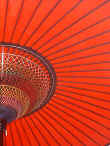 Aug 8-11, 1999 Tokyo, Japan Part I Aug 8-11, 1999 Tokyo, Japan Part IAdmittedly,
our first impression of Tokyo most likely doesn't serve it well. In fact, it's probably
neither fair nor accurate. But the first thing that hits us, square in the eardrums at the
Narita International Airport, are the number of kids here. At least there seems to be a
lot of them. Well, no actually maybe there aren't that many. Maybe it's just that we can't
help but notice the few that are scattered around. They draw our attentions because nearly
every one of them is either screaming, crying, or having a temper tantrum. And so it goes
here in Japan. The first three to four years of life is practically blissful for the
average Japanese. A time of little discipline or hardship. What's the reasoning behind
such lax child rearing?
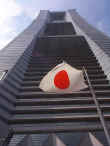 It's thought that this period of reprieve is important for balance,
providing a stark contrast to the next 30-40 years of strict social rules, conformity, and
hard work. All descriptive of our second impression of Japan - that it's orderly,
disciplined, methodical, and mechanical. Maybe it's the handful of subway rides that we've
taken, now well into our second day here, that seem to best epitomize the Japanese
culture. It's trains, simple wonders of modern transit, are not only clean and well
maintained, but also apparently very punctual. Now boarding the fourth or fifth train of
our stay, we notice that you can literally set you watch to the subway's arrivals and
departures - down to the second. We've even been told that on the rare occasion that a
train is late, the conductor will graciously give anyone who requests one, a written and
signed apology, as the boss won't believe the oft used (especially in NYC) 'train was
late' excuse without one. It's thought that this period of reprieve is important for balance,
providing a stark contrast to the next 30-40 years of strict social rules, conformity, and
hard work. All descriptive of our second impression of Japan - that it's orderly,
disciplined, methodical, and mechanical. Maybe it's the handful of subway rides that we've
taken, now well into our second day here, that seem to best epitomize the Japanese
culture. It's trains, simple wonders of modern transit, are not only clean and well
maintained, but also apparently very punctual. Now boarding the fourth or fifth train of
our stay, we notice that you can literally set you watch to the subway's arrivals and
departures - down to the second. We've even been told that on the rare occasion that a
train is late, the conductor will graciously give anyone who requests one, a written and
signed apology, as the boss won't believe the oft used (especially in NYC) 'train was
late' excuse without one.
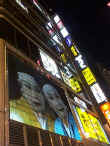 The Japanese boss also won't believe the
not so oft used (except maybe in NYC) excuse that ' on the train somebody stole my
briefcase with that important report in it' excuse either. For on these trains, there
exists very little interaction, let alone crime, between riders. Nope, orderly and calm is
the way of the day. And please, little or no eye contact or speaking to those next to you.
These riders make it a point to keep to themselves, often going so far as to make sure
that the paperback they're reading has a thick paper bookcover so that no one can else can
see which comicbook or novel title has their interest. The Japanese boss also won't believe the
not so oft used (except maybe in NYC) excuse that ' on the train somebody stole my
briefcase with that important report in it' excuse either. For on these trains, there
exists very little interaction, let alone crime, between riders. Nope, orderly and calm is
the way of the day. And please, little or no eye contact or speaking to those next to you.
These riders make it a point to keep to themselves, often going so far as to make sure
that the paperback they're reading has a thick paper bookcover so that no one can else can
see which comicbook or novel title has their interest.
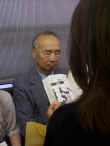 Or, like the fellow next to me, they partake in the
ultimate form of privacy - that of drifting off to sleep. But it could be that it's not
privacy they really want, but just a little rest. I guess that wouldn't be surprising
considering the grueling work schedules and extreme pressures that most of them face. Even
on our way to our hotel, at 11:00pm last night, the train was packed with commuters. Some
looked as though they were just leaving the office, while others looked a bit squint-eyed,
their staggering giving off the evidence of a just ended extracurricular meeting, most
likely a gathering over a few sakes. Or, like the fellow next to me, they partake in the
ultimate form of privacy - that of drifting off to sleep. But it could be that it's not
privacy they really want, but just a little rest. I guess that wouldn't be surprising
considering the grueling work schedules and extreme pressures that most of them face. Even
on our way to our hotel, at 11:00pm last night, the train was packed with commuters. Some
looked as though they were just leaving the office, while others looked a bit squint-eyed,
their staggering giving off the evidence of a just ended extracurricular meeting, most
likely a gathering over a few sakes.
 Those
businessmen, with ties loosened to one side and wrinkled jackets draped over their arms,
provided an almost comical contrast to the fanatical organization around them. Organized
to the point of having lines down the middle of the stairs, complete with arrows and wall
signs indicating on which side one should walk up or down upon. And did I mention clever
and efficient? There are rolling ticket takers to avoid crowds at popular bus stops. The
weather forecasts are delivered with graphs detailing sun vs. rain along the time axis and
temperature along the other. Those
businessmen, with ties loosened to one side and wrinkled jackets draped over their arms,
provided an almost comical contrast to the fanatical organization around them. Organized
to the point of having lines down the middle of the stairs, complete with arrows and wall
signs indicating on which side one should walk up or down upon. And did I mention clever
and efficient? There are rolling ticket takers to avoid crowds at popular bus stops. The
weather forecasts are delivered with graphs detailing sun vs. rain along the time axis and
temperature along the other.
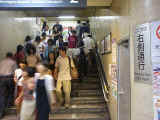 The Japanese have train seats that spin around to the forward
direction with the push of a pedal, and parking garages with large plates that whip cars
around on the spot, making the best use limited space. There's even almost constant
guidance for the blind, with special dotted and dashed tiles embedded in all of the
sidewalks and walkways. Yet with all of their cleverness, the Japanese have yet to figure
out how to make things, well, 'comfortable', at least for visitors. For example, although
color-coded and detailed, all of the station names on the fare maps for the subways are
entirely in kanji. The Japanese have train seats that spin around to the forward
direction with the push of a pedal, and parking garages with large plates that whip cars
around on the spot, making the best use limited space. There's even almost constant
guidance for the blind, with special dotted and dashed tiles embedded in all of the
sidewalks and walkways. Yet with all of their cleverness, the Japanese have yet to figure
out how to make things, well, 'comfortable', at least for visitors. For example, although
color-coded and detailed, all of the station names on the fare maps for the subways are
entirely in kanji.
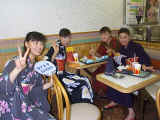 And, although numerous and convenient, 98% of the ATM's in the city
refuse to accept bank cards other that those issued in Japan (but indicative of Japanese
politeness, the machines do have a little animated lady that bows, as what I think is an
apology flashes on the screen, also in kanji). We almost can't help but feel like
uninvited intruders, as we watch the goings-on, customs being observed, and daily habits
and rituals being followed, without having as much as a clue as to what's happening. For
instance, the 'take off your shoes, but don't step on the floor with you un-shoed foot'
thing. Or the 'always bow, and remember, how deep and when are very important elements'
thing. We find out that there's even a special Japanese word for those like us who don't
understand. Gaijin, literally translated 'outside person'. And, although numerous and convenient, 98% of the ATM's in the city
refuse to accept bank cards other that those issued in Japan (but indicative of Japanese
politeness, the machines do have a little animated lady that bows, as what I think is an
apology flashes on the screen, also in kanji). We almost can't help but feel like
uninvited intruders, as we watch the goings-on, customs being observed, and daily habits
and rituals being followed, without having as much as a clue as to what's happening. For
instance, the 'take off your shoes, but don't step on the floor with you un-shoed foot'
thing. Or the 'always bow, and remember, how deep and when are very important elements'
thing. We find out that there's even a special Japanese word for those like us who don't
understand. Gaijin, literally translated 'outside person'.
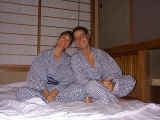 And maybe it's my imagination, but it
feels like people covertly stare at outsiders like us. Or it could have nothing to do with
our social blunders, but simply the fact that we just look so different. Spotting people
that look anything but oriental is a rare occurrence, even in cosmopolitan Tokyo. The
government and society have worked hard to keep the country 'pure', resulting in just
barely over 1% of Japanese citizens being of non-Japanese decent (most of those are
Korean). This being the case, it's difficult, if not impossible, to ever make ourselves
part of the scene. And because we sort of stand out in the crowds, we find that even the
small children stare at us with a certain curiosity, sometimes even exclaiming
"gaijin!" as they pull on their mother's arm. And maybe it's my imagination, but it
feels like people covertly stare at outsiders like us. Or it could have nothing to do with
our social blunders, but simply the fact that we just look so different. Spotting people
that look anything but oriental is a rare occurrence, even in cosmopolitan Tokyo. The
government and society have worked hard to keep the country 'pure', resulting in just
barely over 1% of Japanese citizens being of non-Japanese decent (most of those are
Korean). This being the case, it's difficult, if not impossible, to ever make ourselves
part of the scene. And because we sort of stand out in the crowds, we find that even the
small children stare at us with a certain curiosity, sometimes even exclaiming
"gaijin!" as they pull on their mother's arm.
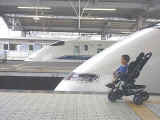 I mull these thoughts over in my head as we
zoom along at almost 170 mph on one of Japan's famous bullet trains, heading for our next
stop, Osaka. I stare out the window and wonder how all of this is effecting my behavior.
Am I slowly slipping into shyness, making sure not to offend with something as 'direct' as
a glance into their eyes? Maybe. But from now on, I'll just be myself. To heck with this
timid and/or shy nonsense, proper for Japanese culture or not. Not that I plan to be
intimidating or rude, I'm just finished with walking around staring at the floor. I mull these thoughts over in my head as we
zoom along at almost 170 mph on one of Japan's famous bullet trains, heading for our next
stop, Osaka. I stare out the window and wonder how all of this is effecting my behavior.
Am I slowly slipping into shyness, making sure not to offend with something as 'direct' as
a glance into their eyes? Maybe. But from now on, I'll just be myself. To heck with this
timid and/or shy nonsense, proper for Japanese culture or not. Not that I plan to be
intimidating or rude, I'm just finished with walking around staring at the floor.
|



